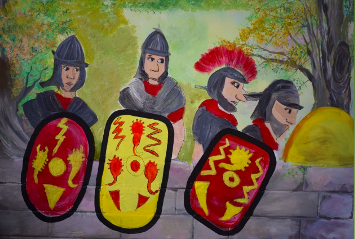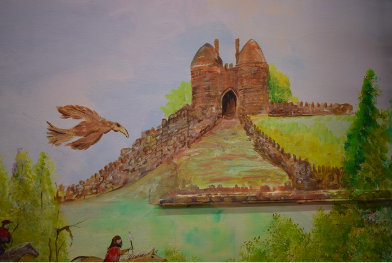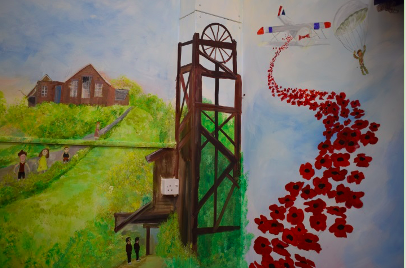History Rationale
At Lydbrook School we are Historians!
At Lydbrook Primary School, we believe that history should inspire pupils’ curiosity to know more about the past and that teaching should equip pupils to ask a range of questions, think critically, weigh evidence, scrutinise arguments and develop perspective and opinions.
To fuel their curiosity and sense of belonging, children at Lydbrook School are immersed, wherever possible, in the meaningful context of their local history. From 2017 until 2022, Lydbrook Primary School was the lead school for the Foresters’ Forest National Lottery Heritage Funded Programme. As a school we are proud to have worked with the Foresters’ Forest Programme to not only re-design our own history curriculum, but inspire other schools in the area so that as many children as possible are enthused and inspired to learn from and explore their unique forest environment. We aim to build a legacy of proud, active, interested Foresters who will work to protect and promote their heritage.
By the time they leave us at the end of Year 6, we want our children:
- To have developed a passion for and commitment to history and a real sense of curiosity to find out about the history of British history, including that of their local area, as well as the wider world.
- To ask historically valid questions that can be further investigated.
- To have an excellent knowledge of the different ways the past can be investigated and interpreted with an awareness that no single source of evidence can give the full answer to questions about the past.
- To understand the concept of propaganda and how historians must understand the social context of the evidence studied.
- To confidently be able to recall the characteristic features of the historical themes studied including the ideas, beliefs, attitudes and experiences of men, women and children.
- To have a secure understanding of chronology by being able to place the historical themes studied on a timeline.
- To be knowledgeable and passionate about the history of their local area.
- To communicate historically, both orally and in written forms, using accurate historical vocabulary.
National Curriculum Purpose for History:
A high-quality history education will help pupils gain a coherent knowledge and understanding of Britain’s past and that of the wider world. It should inspire pupils’ curiosity to know more about the past. Teaching should equip pupils to ask perceptive questions, think critically, weigh evidence, sift arguments, and develop perspective and judgement. History helps pupils to understand the complexity of people’s lives, the process of change, the diversity of societies and relationships between different groups, as well as their own identity and the challenges of their time.
Links with the National Curriculum Aims for History:
- Know and understand history as a coherent, chronological narrative, from the earliest times to the present day: how people’s lives have shaped this nation and how Britain has influenced and been influenced by the wider world
- Know and understand significant aspects of the history of the wider world: the nature of ancient civilisations; the expansion and dissolution of empires; characteristic features of past non-European societies; achievements and follies of mankind
- Gain and deploy a historically grounded understanding of abstract terms such as ‘empire’, ‘civilisation’, ‘parliament’ and ‘peasantry’
- Understand historical concepts such as continuity and change, cause and consequence, similarity, difference and significance, and use them to make connections, draw contrasts, analyse trends, frame historically-valid questions and create their own structured accounts, including written narratives and analyses
- Understand the methods of historical enquiry, including how evidence is used rigorously to make historical claims, and discern how and why contrasting arguments and interpretations of the past have been constructed
- Gain historical perspective by placing their growing knowledge into different contexts, understanding the connections between local, regional, national and international history; between cultural, economic, military, political, religious and social history; and between short- and long-term timescales.
Links with EYFS: Understanding of the World
30-50 months
Begin to make sense of their own life story and family’s history.
40-60 months
Comment on images of familiar situations in the past.
Compare and contrast characters from stories, including figures from the past.
Early Learning Goal:
Children talk about the lives of people around them and their roles in society. They know about similarities and differences between things in the past and now, drawing on their experiences and what has been read in class. Children understand the past through settings, characters and events encouraged in books read in class and storytelling.
Implementation: How History is taught at Lydbrook School
In ensuring high standards of teaching and learning in history, we implement a long-term, progressive curriculum where history is taught as part of termly themes ensuring coverage of the knowledge outlined in the National Curriculum. Planning and teaching of historical skills is supported by progressive ‘Milestones’ (Chris Quigley Education: The Essentials Curriculum) linked to four key concepts that drive our history curriculum:
- Investigating and interpreting the past
- Building an overview of world history
- Understanding chronology
- Communicating historically
The long-term plan is based on a 2-year cycle. The themes are engaging and ensure history is not only taught as a discrete subject but alongside other subject areas where the skills and knowledge can be applied.
A large focus for our historical learning is linked to the meaningful context of the local area. Within the local history studies, there is a strong link with geography as children identify the physical features of the Forest of Dean, including how the Forest has been shaped by its unique geology and physical isolation between two rivers. To fuel children’s curiosity and sense of belonging, we believe experiencing field work and the opportunity to meet a range of visitors enables children to take advantage of the rich history that surrounds us. Where possible, children are immersed with memorable experiences at the beginning of their new learning which supports them in being able to ask historically valid questions.
Impact
History is a main driver for theme plans that creatively link to other subject areas allowing children to explore historical concepts in depth and make strong connections. Pupils’ rich experiences within themes are memorable and further aid depth of learning and retention of key knowledge over time.
Oracy is key driver for our curriculum and each of our history themes end with a class assembly where children present their learning to the school and parents. As well as supporting children who are presenting to consolidate their learning, this allows all children to regularly re-visit history themes and key learning.
The subject leader ensures that both National Curriculum knowledge and Milestone skills are taught simultaneously through the monitoring of theme plans, learning walks, pupil voice and book looks.
- Teachers use milestones to assess children and to ascertain whether children have reached the expected standard at the end of Year 2, 4 and 6. To have reached the standard, pupils will have demonstrated they have achieved the necessary attainment in each of the four key concepts (investigating and interpreting the past, building an overview of world history, understanding chronology and communicating historically).
Assessments will be supported by the work produced by the children in their theme books as well as their developing knowledge and understanding through pupil discussion. In some instances, ’Exit Cards’ will be used to support assessment judgements.



